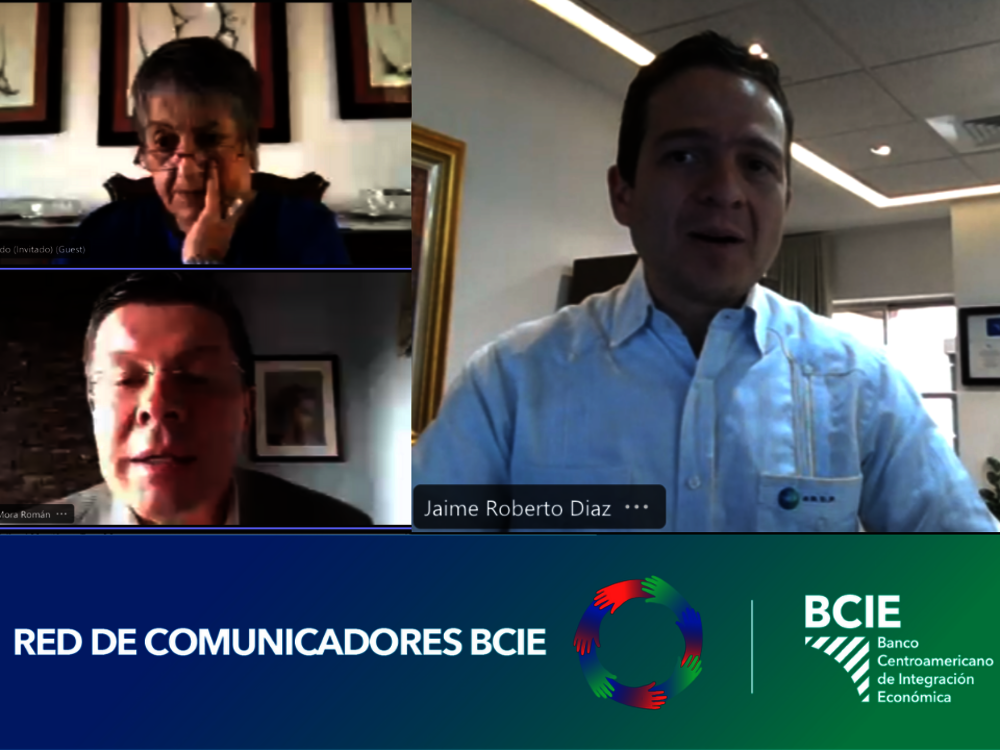CABEI presents challenges to building a regional identity

During a discussion with the Bank's Network of Communicators, the achievements and integrationist challenges identified in the Sixth State of the Region 2021 Report were analyzed.
Tegucigalpa, October 29, 2021.- Central America in recent decades has not only expanded its borders to include adjacent isthmus territories, such as Panama and Belize, but even a non-contiguous Caribbean island state, the Dominican Republic, in the regional integration process.
Despite these efforts, there is no regional identity among its inhabitants, but rather most associate it with the sum or aggregation of its parts, and in some cases include or exclude the nations mentioned from the "historical Central America" made up of the five colonial provinces.
However, there is a broad disposition in the region in favor of some type of regional integration, especially in the economic sphere, a valuable asset for promoting joint action among the countries.
This is what emerges from the chapter "Visions on Central America and Regional Integration" of the Sixth State of the Region 2021 Report recently published with the support of the Central American Bank for Economic Integration (CABEI), which was presented in a virtual meeting to more than 50 communicators from public institutions in the region who are members of the Bank's Communicators Network.
"These forums provide a space for meeting, analysis and reflection on the achievements and obstacles we face as a region, and today they are even more important because we are examining the perception and vision of Central Americans in the context of the Bicentennial of Independence," said CABEI Executive President, Dr. Dante Mossi.
During the meeting, which included the participation of CABEI Executive Vice President, Jaime Roberto Díaz, the Report's research coordinator, Alberto Mora Román, and the former Ambassador of Costa Rica and Founder of the Copán Circle, Mimi Prado, the need for a joint work agenda was discussed.
"The chapter of the report analyzed seeks to deepen public reflection and debate on the importance of regional action for our countries, with open economies and strongly impacted by regional, transnational and global dynamics that today determine many of their challenges and opportunities to optimize resources and efforts, also to improve the margins of maneuver and results of the actions that each nation would undertake acting separately," emphasized Mora.
According to the perspective of the Central Americans consulted in the study, priority issues include security, education, climate change and human rights. In addition, it was highlighted that Central American leaders identify the private sector as one of the key actors to promote dialogue and articulation along with others such as the State, social movements, and international cooperation.
The importance of a regional identity
To resolve the barriers to building a prosperous region by developing strategies that effectively address the shared challenges, opportunities and challenges of today's Central America, a regional identity is required.
Mora explained that, in practice, Central Americans assume that Central America is the sum of its parts without being able to identify a symbolic added value that can be assumed as a source of shared identity.
"This lack of a 'we,' a focus of shared symbolism, certainly complicates the possibility of galvanizing joint action through a clear mandate from societies to governments and political systems at the national level," the researcher noted.
Panelist Mimi Prado concluded by stressing the importance of spaces such as this one organized by CABEI, since it comes at a "crucial moment in the history of Central America" such as the joint celebration of the Bicentennial, a propitious time to discuss all these issues in depth, and to analyze in depth how to position the importance of joint action and regional integration as a platform for countries to implement public policies on issues that have dynamics that transcend their borders.



